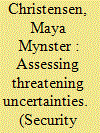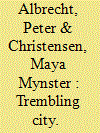|
|
|
Sort Order |
|
|
|
Items / Page
|
|
|
|
|
|
|
| Srl | Item |
| 1 |
ID:
189909


|
|
|
|
|
| Summary/Abstract |
The preemptive turn in counterterrorism has turned future uncertainties into key objects of contemporary security governance. From an empirically grounded perspective, this article contributes with novel insight into the everyday practices of preemptive politics. Focusing on Ghana as a unique case through which to trace how the mobilization of affect accelerates the transnational proliferation of counterterrorism measures and the commodification of future uncertainty, it shows how the global War on Terror has shaped the emergence of counterterrorism in a context characterized by the absence of terrorist attacks on home soil. Exploring how preemption animates outreach activities, simulation exercises, and nighttime patrols, it shows how police officers attempt to make uncertain futures tangible and actionable through practices of imagination and performance. Aimed at assessing terrorist threats that have not (yet) materialized, the article argues that preemptive policing practices cause a conflation of ordinary crime and extraordinary terror that inflates already existing uncertainties and subverts the institutional security logics of preemption.
|
|
|
|
|
|
|
|
|
|
|
|
|
|
|
|
| 2 |
ID:
188706


|
|
|
|
|
| Summary/Abstract |
While divided cities are characterized by spatially cemented segregation and polarized divisions, the trembling city is organized around transient and transformative borders. We conceptualize this notion of urban space to capture Freetown’s war-peace transition in the late 1990s and early 2000s. Ex-combatants settled on the city margins, bringing with them spatial strategies from war-fighting into the city by recreating a system of bases. The Sierra Leone Police (SLP) re-emerged with external support, seeking to compartmentalize and fixate Freetown through a combination of force and negotiation. We use borders and bordering to understand policing as attempts by both ex-combatants and the SLP to border in as well as out; defensively against external interference and offensively to make territorial claims. By extension, it is tensions in these practices between attempts to defend and harden borders, and at the same time, expand and soften them that trigger a tremble. The city tremble was a reminder of the possibility of war that Freetown very easily could return to. It also became a more general and inconspicuous condition of the city as an inhabited space, where multiple and often incompatible and conflictual spatial logics, strategies, and practices of policing clashed, overlapped and co-existed uneasily.
|
|
|
|
|
|
|
|
|
|
|
|
|
|
|
|
| 3 |
ID:
145183


|
|
|
|
|
| Summary/Abstract |
In the aftermath of the Sierra Leone civil war, demobilized militia soldiers have become an attractive resource to private security companies. Based on extensive ethnographic fieldwork, this article traces the outsourcing of security at American military bases in Iraq to Sierra Leonean ex-militias, facilitated by a British security company and the Sierra Leone government. In doing so, the article contributes to the ongoing scholarly debate on the privatization of security by offering a “local” ethnographically informed perspective on the micro-dynamics of “global” security. It is argued that the supply of global security depends on a form of local immobility: on a population that is “stuck”, yet constantly on the move to seize opportunities for survival and recognition. Structured by a chronological account of the recruitment, deployment, and deportation of Sierra Leonean ex-militias, the article discusses how these former militia soldiers experience being reduced to mere bodies rather than recognized labourers. It concludes that notions of race and slavery are employed by the ex-militias to make sense of their predicaments, but most notably as a moral response to the unequal relationships in which they find themselves embedded, in the context of security outsourcing in a global economy.
|
|
|
|
|
|
|
|
|
|
|
|
|
|
|
|
|
|
|
|
|